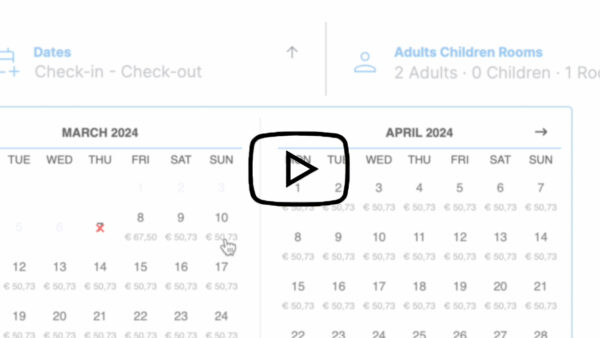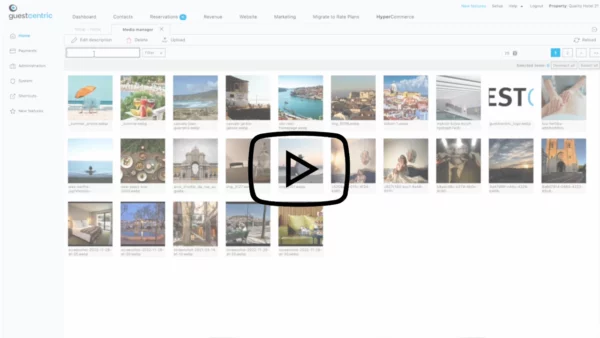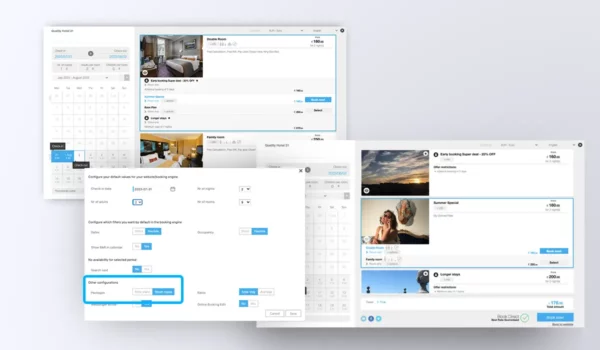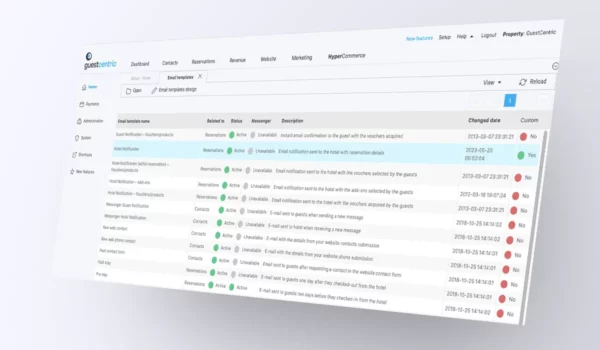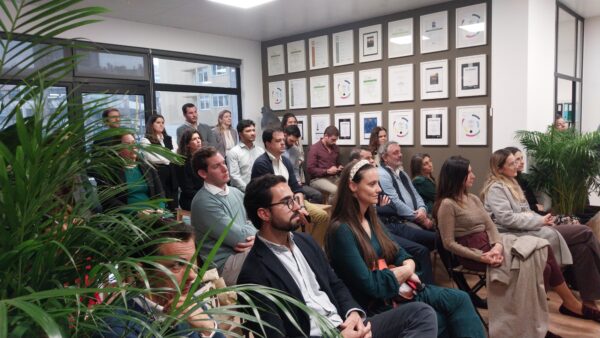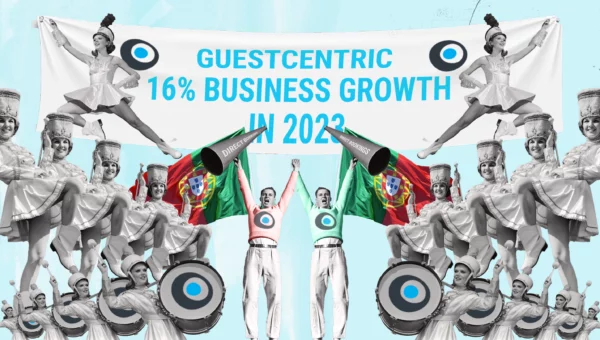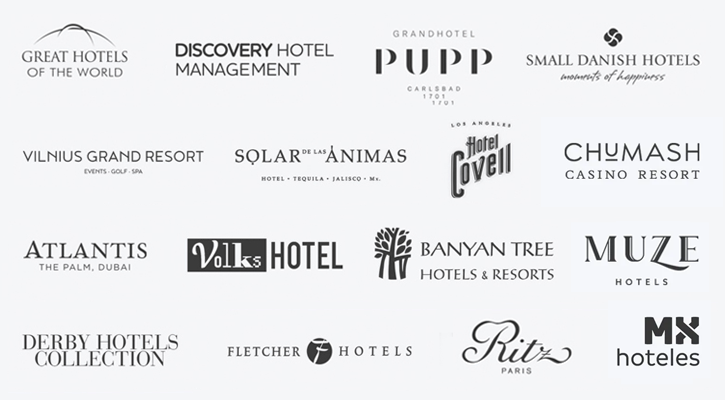Hotel Sales & Marketing Tips for Business Success
Reading Time: 10 minutesHow can Hotels differentiate themselves from the Competition in 2023?
Much has changed for hotels over the past few years, with some trends that were introduced during the pandemic seemingly here to stay. In this article, we take a look at the challenges hotels are facing today, and outline a list of Hotel Sales & Marketing Tips you should implement to differentiate your business from the competition in 2023.
What are some of the Challenges and Concerns facing Hotels in the run up to 2023?
Current market signals point strongly to a winter like 2019. However, as we have learned over the past few years, the market can change rapidly at any time. Due to factors such as inflation and rising energy costs, the industry has begun to speculate on what winter of 2022 and 2023 could look like. These concerns are as follows:
The Price of Air Travel
In summer 2022, we saw record-breaking prices for air travel, and due to pent-up demand, guests had little to no issues paying more to get away.
But with looming inflation and lower levels of travel during the autumn and winter months, it seems airlines in the US may reduce prices to stimulate demand. Early data published by travel app, Hopper at the end of August 2022 shows that domestic airfare in the US has already dropped by 37% following the peak summer period.
In Europe however, flight prices seem set to rise. According to a recent article published in the Netherland Times, ticket prices to fly within Europe will likely increase this winter due to rising fuel costs, as well as fees and tax hikes. “We expect price increases of between 10 and 20% in the winter as a result of the flight tax, the sharp increase in airport charges and more expensive kerosene,” said Marnix Fruitema of aviation representative organization Barin told the newspaper.
A somewhat longer distance trip to the Canary Islands or Cape Verde will be about €100 more expensive this winter, and about 50 to €60 more expensive next summer. “This means that travel is becoming more expensive, while purchasing power is falling. The consumer will take a step back,” said Corendon’s Steven van der Heijden to De Telegraaf.
We have yet to see what the knock on effect of pricing will be in terms of demand and hotel pricing during the winter period in 2022 and 2023.
Hotel ADR in Winter 2022 to 2023
Currently, we are still seeing significantly high levels of demand in the foreseeable future, currently around 25% above 2019 levels. However, as is the nature of the season, we realistically expect demand to taper off somewhat. When this happens in cities and hotels become more competitive, the big question is how this will impact ADR.
At this stage however, it seems pricing is likely to hold and perhaps even increase over the next 12 months, according to our Hotel Business Barometer results published in the September 2022 edition of The Hotelier PULSE Report.
The Level of Far East Travel into Central Europe
Another big question is what will happen in terms of far-east travel. At Guestcentric, we are currently seeing some groups and corporate groups traveling from India into central Europe for really long stays (between 30 to 60 days). So the question is, will that resume on a larger scale during the autumn and winter of 2022 to 2023?
If this does resume during the winter, then demand will remain high and therefore ADR will remain high. Although we know that China is not resuming outbound travel in the foreseeable future, we must still consider other markets across Asia and whether we’ll see an influx of travel into Europe and the US.
Guest Appetite for Sustainable Travel
Research by Skift shows that 83% of global travelers think sustainable travel is vital. In addition, according to Booking’s Sustainability Report 2021, 73% of travelers would be more likely to choose an accommodation if it has implemented sustainability practices.
We’re also seeing a lot in the RFPs for corporate rates and groups, where guests want to know what sustainable practices (either local or environmental) that hotels have in place. That may be a significant challenge moving forward, in terms of how hotels can and should be more connected to the local business environment.
What are Hoteliers prioritizing to Differentiate from the Competition in the current Climate?
A number of trends have emerged since the beginning of the pandemic that are still holding strong today. Since March 2020 up until the present day, we have been surveying thousands of Hoteliers worldwide each month to determine which of these trends they are prioritizing, which are as follows:
- Direct Channel as the Top Source of Reservations
- Domestic Market & Staycations
- Sustainable Tourism
- Contactless Technology
- Working from the Hotel
Since we launched our Hotel Business Barometer back in April 2020 up until the present day, Hoteliers have consistently prioritized making their direct channel the top reservation channel. Recent months have also shown that the focus on sustainable tourism is also rising to the forefront of Hoteliers’ priorities to differentiate themselves from the competition.
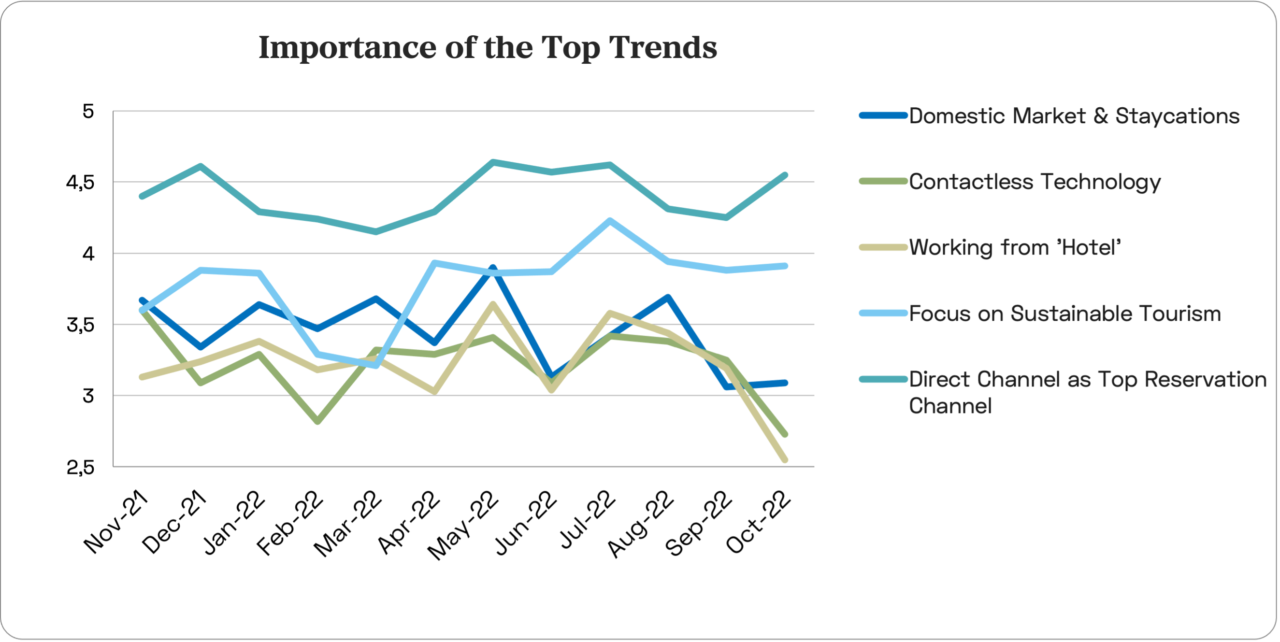
So, why did these trends rise to the top of Hoteliers’ priorities and remain consistent from April 2022 until today? Below is the breakdown:
Direct as the Top Reservations Channel
Travel restrictions and mass cancellations at the start of the pandemic drove most consumers to seek out reimbursements. However, many of the fares booked were non-refundable, with some analysts reporting that as much as half of trips booked on Booking or Expedia were non-refundable. But when faced with the risk to health and safety, guests felt pushed into an unfair position as they wrangled to get their money back from the OTAs.
This resulted in an influx of guests reaching out to hotels directly, because hotels were more trusted to cater to the needs of guests. Most hotels offered flexibility, allowing guests to postpone stays to future dates. Making matters worse however, Booking then decided to reimburse every single guest, even those who had accepted credit for a future stay.
Hotels subsequently rebelled and capitalized on the direct connection to guests, keeping customers informed of what to expect and offering flexible policies and cancellations. Guests soon learned that they could trust hotels to better meet their needs in comparison to the OTAs who did not provide the level of service so urgently needed at the time.
Although OTAs have reverted to more aggressive marketing tactics this year, guests are still reaching out to hotels directly. With more direct bookings than ever, the next step will be to maintain the position. It’s not surprising that this remains at the forefront of Hoteliers’ minds in the run up to 2023.
Focus on Sustainable Tourism
When global tourism came to a halt in March 2022, Hoteliers were forced to bring back local and sustainable tourism, in ways that are beneficial to both the local economy, social cohesion, and the environment. As a result, many hotels worldwide are actively communicating their sustainable practices to prospective guests. Below are just a few examples:
- Memmo Hotel Baleeira, Portugal: Achieved EarthCheck Benchmarking Certification, used to measure key environmental indicators including energy and water consumption; total waste production, and community commitment.
- Hotel Okura Amsterdam, Netherlands: Offers Green Globe certified facilities, saving energy and water resources, reducing operational costs, and positively contributing to local communities and their environment.
- Hotel Punta Islita, Costa Rica: Already won several sustainability awards due to their focus on wildlife conservation, reforestation, and local employment.
This deeper awareness around the impact of travel and what it means for sustainability and local residents, seems here to stay. Particularly because guests, too, are now more than ever focused on sustainable travel practices.
A few other Hotel Priorities to Mention…
Investment in Automation and Technology
Following what is now called, ‘The Great Resignation’, many hotels have been challenged with overwhelming consumer demand and limited staff to respond. Thus, hotels are investing in automation and technology to ease staff workload and do more with less human resources.
Hoteliers who have participated in our monthly Hotelier PULSE live panel, co-hosted with Techtalk.travel, have highlighted how the pandemic drove them to invest in upgrading their tech stack in response to changing market conditions. Steffi Breitsprecher, Director of Revenue & Distribution at MEININGER Hotels, said: “We introduced a number of key projects in 2020, strongly focused on digital optimization for our website and IBE.”
Ben Thomas, Chief Commercial Officer at Penta Hotels said: “Given the ongoing market uncertainty, we saw booking pace decrease drastically from 28 days to just 5 days or less. With mobile bookings on the rise, one of our first steps was to deploy a new mobile-first website. From there, we identified where prospective guests were searching for us online and implemented steps to increase visibility in these channels. All of our efforts have holistically focused on funneling the customer journey from search to the transaction.”
Independent Hotels embrace Small Soft Brands and Collections
The Covid-19 crisis left independent hotels more vulnerable to financial losses in comparison to bigger chains. This led to an increase in independent hotels choosing to join soft brands.
Independent hotels benefit from a soft brand association, offering them a more cost-effective and flexible solution than the long-term franchise contracts typical of many of the larger brands – even with “soft brands”, such as Marriott’s Autograph Collection. With a true “soft brand” , such as Great Hotels of the World, independent hotels receive sales, distribution and marketing support from the larger brand, whilst retaining their individual technology options and branding.
Optimizing Google Visibility for More Direct Bookings
Whether it’s optimizing their Google My Business listing to increase organic website traffic, or competing on Google Hotel Ads, more and more hotels are prioritizing Google visibility. Hoteliers that do not have a presence on Google risk losing out on a sizable chunk of direct business online.
How can Hotels differentiate themselves from the Competition in 2023?
While current market signals indicate positive things to come for hotels, it’s important to continue taking steps to differentiate your hotel from the competition. Below are some of our recommendations:
Maintain the Direct Connection with Guests
Informing your guests to what they can expect is critical. For example, if you are running a limited service, let guests know so that you do not receive bad reviews later on. In the same token, if you have full service, inform guests and highlight this information across your direct channels, such as your website or social media. Don’t rely on third-parties to interact with guests on your behalf, but instead continuously communicate with your guests at all stages of their journey from online search to check-out.
Incentivize Direct Bookings
Most importantly, hotels should also ensure they incentivise guests to book directly on their websites. In addition to special offers exclusive for direct bookers, some hotels are also strategizing Best Price Guarantee offers, declaring war on OTAs. These hotels challenge the consumers to find a cheaper rate on other websites and pledge to match the cheapest price.
This is a great way to increase hotel revenue. It also relays a message to consumers that booking directly with the hotel will be the most beneficial, because the hotel is willing to do what it takes to give the guests the best deal and experience.
Invest in Automation and Technology
Given current staff constraints, hotels should consider investing in automation to lighten the workload and respond to overwhelming consumer demand. While it’s impossible to know upfront everything there is to know about a prospective technology supplier or distribution partner, below are some core questions you should ask a prospective partner before investing:
How will the new solution make hotel operations and commercial activities more efficient?
How will the new solution save your hotel time and money going forward?
How will the new solution help your business respond to overwhelming consumer demand and improve online business performance?
Of course, it goes without saying that you should only consider vendors who respond with a proven track record of how they can help your business in the long run.
Consider joining a Soft Brand
The last two years have seen a strong shift towards hotels joining soft brands, such as our own Great Hotels of the World with its collection of some 60 characterful larger upscale and luxury Bleisure hotels worldwide. Membership of GHOTW provides them with access to our international sales offices; group sales and additional revenue generation; our signature GHOTW sales events; preferred partnerships such as American Express Meetings & Events; GDS connectivity under the GW label; as well as social media and communication to amplify their hotel’s presence.
We also tapped into a niche market looking for authentic and country-specific options with the launch of Small Portuguese Hotels, which now numbers some 140 properties nationwide. Member hotels benefit from an umbrella brand with professional digital marketing and sales support; PR and media relations; and economies of scale in preferred partnerships and suppliers.
Make sure your Hotel is present on Google
According to a recent consumer survey published by Hospitality Technology, nearly 40% of travelers research on Google prior to booking. Therefore, it is not only nice to have your hotel visible on the search engine, but absolutely essential!
Hotels should first focus on their organic Google presence by continuously updating and engaging with Google My Business. Make sure your Google My Business listing contains up-to-date information about your hotel and a direct link to your hotel website and booking engine, as this is the primary entry point for most Google users. You should also answer all questions on Google My Business and reply to the guest reviews.
Hotels may also want to consider competing on Google Hotel Ads or listing their property on Google Hotel Free Booking Links, both of which have a much lower cost structure in comparison to the OTAs.
Keep your Hotel Visible on the GDS
In 2022, GDS bookings are making a comeback, particularly for resorts and other leisure-centric hotels. We also anticipate a significant level of travel from the US market into Europe via the GDS. Thus, we recommend that hotels be visible on the GDS, not only for corporate travel but also leisure travel.
The more agile and far-seeing travel agencies are developing strategic partnerships with corporations, even if not necessarily for corporate travel. These partnerships are proving to be an effective strategy in 2022 and beyond.
Highlight Sustainable Practices
Guests’ awareness of the environmental impact of their trips is at an all-time high, and your hotel should address these concerns by implementing and communicating sustainable practices and initiatives. Be sure to actively highlight your hotel’s sustainable certifications and practices via all your direct channels.
Use Social Media as an additional Direct Traffic Source
Social media has significantly changed how travelers research before going on a trip. We are now encouraged to share our travel experiences, and this has transformed the way we make decisions as consumers. People build their trust in a hotel, airline, or travel agency based on the reviews of others.
Below are the big three in terms of social media platforms hotels should be visible on:
- Instagram: Thanks to its emphasis on dream-inducing imagery, Instagram is one of the most effective social media channels for hotels to engage with guests. Using Instagram helps Hoteliers attract travelers, especially the millennials who form a substantial and highly active group on Instagram. Be sure to both follow and use travel hashtags related to your destination and hotel. You can also create your own to maximize the popularity of your posts.
- Facebook: As one of the most prominent social media platforms, Facebook gives Hotels access to a wide variety of social groups. In addition, its recommendations feature enables travelers to share their experiences. Facebook is also an excellent source of information about what guests are saying about your hotel and destination.
- Twitter: This platform is essentially your voice, allowing you to talk about short travel tips and promos. Even though Twitter can be used for photos and videos of your brand, its actual strength is being especially useful for providing customer service.
Conclusion
The world of travel is never stagnant, and hotels that wish to differentiate themselves from the competition must be prepared and agile to adapt to the rapid pace of change.
A major trend to have emerged from the pandemic is the rise of hotel direct bookings. And although OTAs have reverted to more aggressive marketing tactics, hotels should continue to first and foremost prioritize the direct connection with guests who are now more than ever engaging with hotels directly prior to booking. In addition, hotels should invest in tools and solutions to make engaging with guests easier and less strenuous on human resources.
What is your hotel prioritizing to differentiate from the competition? Let us know in the comments thread below.


